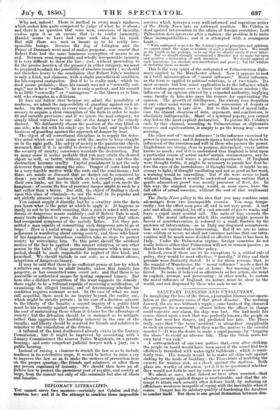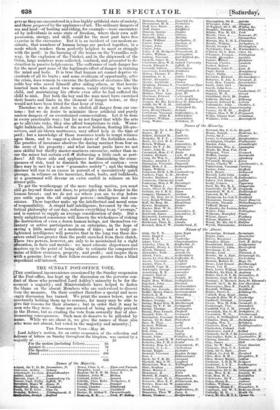SALUTARY DANGERS AND UNSALUTARY.
In moralizing the loss of the Orion, a journalist blames over-spoon- lotion as the primary cause of that great disaster. The morning dawned, the sea was without a ripple; • some banks of fog obscured the prospect for a moment, —almost before the officer in charge could conceive any alarm, the ship was lost. She had made her course direct upon a rock that was perfectly known; the people on shore had seen her danger, and predicted her fate. The Times truly says that" the term accident' is altogether inapplicable to such an occurrence." What then was the motive to the suicidal murder P.—It was the desire to make a rapid passage, by "hugging the shore" to avoid an adverse tide. Thus the Orion made her own fatal "sea risk."
A correspondent of our own notices that, even after striking, the people on board would have been saved if the vessel had been effectively furnished with water-tight bulkheads ; which is mani- festly true. His remedy would be to make all ships safe against sinking by the mode of building : the Times hints at mulcting the owners for wanton risk, as a check against the motives. Both plans are worthy of attention, yet it is to be questioned whether they would not both be met by some new evasion. We admit at once, what indeed we have often asserted—that absolute security against danger is unattainable, and that the at- tempt to attain such security, often defeats itself, by inducing an effeminate weakness incapable of coping with the inevitable when it comes. Danger has its salutary quality of hardening the faculties to combat ileelf. But there is one grand distinction between dano gers as they are encountered in a less highly artificial state of society, and those prepared by the appliances of art. The ordinary dangers of sea and land—of boating and riding, for example—were encounter- ed by individuals in some state of freedom, where their own self- possession, energy, and skill, could for the most part have free exercise in the encounter. But it is an incident of our modern ac- cidents, that numbers of human beings are packed together, in a mode which renders them perfectly helpless to meet or struggle with the peril : in the burning of the trams on the Versailles rail- way, in the explosion of the Cricket, and in the shipwreck of the Orion, large numbers were collected, confined, and presented to de- struction in passive helplessness. The sufferance of such danger has for the most part none of the legitimate effect of danger in training the mind and body. It is true that human art cannot deprive vi- cissitude of all its traits ; and some residuum of opportunity, after the crisis, does remain to exercise the faculties of creatures like the noble boy who saved himself after aiding others, or that heroic- hearted man who saved two women, vainly striving to save his child, and maintaining his efforts even after he had suffered the child to sink. But both the boy and the man must have exercised their hearts and limbs in the element of danger before, or they would not have been fitted for that hour of trial.
Therefore we do not desire to abolish all danger from our cus- toms: but we do desire to minimize these artificial and purely useless dangers of an overstrained commercialism Let it be done in every practicable way ; but let us not forget that while the arts go to alleviate risks they also afford temptations to risk. Water- tight bulkheads, life-boats of the newest fashion, floating life-pre- servers and air-blown mattresses, may afford help in the time of peril ; but a knowledge of those resources tends to tempt reliance von them, and to suggest a closer shave of the forbidden rooks. The practice of insurance absolves the daring mariner from fear on the score of his property; and what instant perils have we not seen skilful but thrifty master-mariners encounter, rather than in- cur the minor but certain evil 8f disbursing a little cash as port- dues ! All these aids and appliances for diminishing the conse- quences of risk, tend to diminish the motives of caution: even fines may be met by a new " guarantee society " ; and the trading mariner will run to an excess in pursuit of a speculatively quick passage, in reliant* on his insurance, floats, boats, and bulkheads, as a gourmand will devour an extra surfeit in reliance on his dinner-pills.
To get the weathergage of the mere trading motive, you must still go beyond floats and fines, to principles that lie deeper in the human breast; and we do not see where you are to stop before you settle upon the old original powers—intelligence and con- saience. These together make up the intellectual and moral sense of responsibility. A stupid half intelligence, favoured by the sta- tistical philosophy of our day, reduces everything to an "average," and is content to supply an average consideration of duty. But a truly enlightened conscience will discern the wickedness of risking the destruction of even a dozen human beings, not themselves vo- luntary or active participators in an enterprise, in the hope of saving a little money or a modicum of time; and a truly en- lightened intelligence will perceive that in the long run these dis- asters entail loss greater than the profit snatched from their clutch. These two powers, however, are only to be maintained by a right education, in facts and morals: we must educate shipowners and masters up to the point of being able to estimate the comparative value of fellow creatures, property, and profit ; and inspire them with a. genuine love of their fellow creatures greater than a blind superficial self-interest.



























 Previous page
Previous page